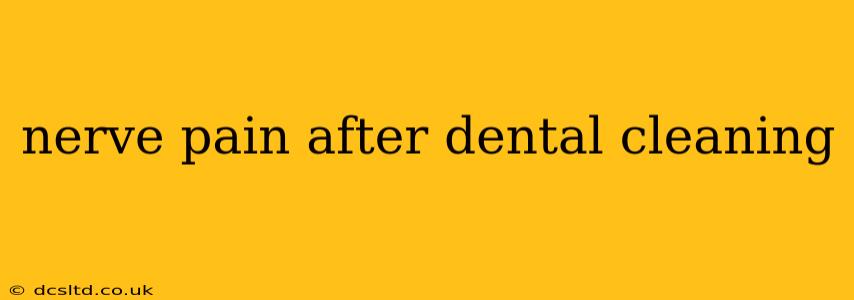Dental cleanings are essential for maintaining oral health, but sometimes, they can lead to unexpected consequences like nerve pain. This discomfort can range from mild tingling to intense, shooting pain, significantly impacting your quality of life. Understanding the causes, treatment options, and preventive measures is crucial for managing this issue effectively. This comprehensive guide will delve into the various aspects of nerve pain following a dental cleaning, answering common questions and providing valuable insights.
What Causes Nerve Pain After a Dental Cleaning?
Nerve pain after a dental cleaning, also known as post-cleaning neuralgia, can stem from several factors. The most common causes include:
-
Inflammation: The cleaning process, while necessary, can sometimes cause minor inflammation near the nerves in your jaw or gums. This inflammation can put pressure on the nerves, leading to pain.
-
Instrumentation: The instruments used during cleaning, such as dental picks and ultrasonic scalers, can inadvertently irritate or even slightly damage the nerve tissues. This is usually temporary but can cause significant discomfort.
-
Pre-existing conditions: Individuals with underlying conditions like trigeminal neuralgia or other nerve disorders are more susceptible to experiencing heightened nerve pain after dental procedures.
-
Anesthesia effects: Though rare, some individuals may experience lingering effects from the local anesthesia used during the cleaning, manifesting as nerve pain.
-
Sinus infection: In some instances, pain perceived as originating from the teeth might actually stem from a sinus infection. The proximity of sinuses to the upper teeth can cause confusion in pinpointing the pain source.
Is Nerve Pain After a Dental Cleaning Normal?
While not entirely "normal," some degree of temporary discomfort or sensitivity after a dental cleaning is relatively common. This usually subsides within a few days. However, persistent or severe nerve pain is not normal and requires professional attention. If the pain is intense, lingers for more than a few days, or worsens, it's crucial to contact your dentist immediately.
How Long Does Nerve Pain After a Dental Cleaning Last?
The duration of nerve pain varies significantly depending on the cause and individual response. Mild discomfort often resolves within 24-48 hours. More significant pain might last several days to a couple of weeks. Pain persisting beyond this timeframe warrants a consultation with your dentist or a specialist.
How to Treat Nerve Pain After a Dental Cleaning?
Treatment depends on the cause and severity of the pain. Common approaches include:
-
Over-the-counter pain relievers: Ibuprofen or acetaminophen can help manage mild to moderate pain.
-
Anti-inflammatory medication: Your dentist might prescribe anti-inflammatory drugs to reduce swelling and inflammation around the affected nerve.
-
Rinsing with salt water: Gently rinsing your mouth with warm salt water can help soothe irritated gums and reduce inflammation.
-
Cold compresses: Applying a cold compress to your jaw can help reduce swelling and numb the area.
-
Prescription medications: In cases of severe or persistent pain, your dentist might prescribe stronger pain relievers or nerve medications.
How to Prevent Nerve Pain After a Dental Cleaning?
While you can’t entirely eliminate the risk, you can take steps to minimize it:
-
Inform your dentist about any pre-existing conditions: Disclosing any medical history, especially nerve disorders, is crucial to enable your dentist to adjust their approach during the cleaning.
-
Choose a gentle cleaning technique: Discuss gentler cleaning methods with your dentist, if you’ve experienced nerve pain in the past.
-
Maintain good oral hygiene: Regular brushing and flossing help prevent the buildup of plaque and tartar, making cleanings less invasive.
Can Nerve Damage Occur During a Dental Cleaning?
While rare, nerve damage is a possible complication of dental cleaning. This usually occurs due to trauma or excessive pressure on the nerves during the procedure. If you suspect nerve damage, seek immediate dental attention.
What are the Long-Term Effects of Nerve Pain After Dental Cleaning?
Most cases of nerve pain after a cleaning resolve without long-term effects. However, in rare instances, persistent nerve damage can lead to chronic pain. Prompt treatment is key to minimizing the risk of long-term consequences.
This information is for general knowledge and doesn't substitute professional medical advice. Always consult your dentist for any concerns regarding nerve pain after a dental cleaning. They can properly diagnose the cause and recommend the most appropriate treatment plan for your specific situation.
